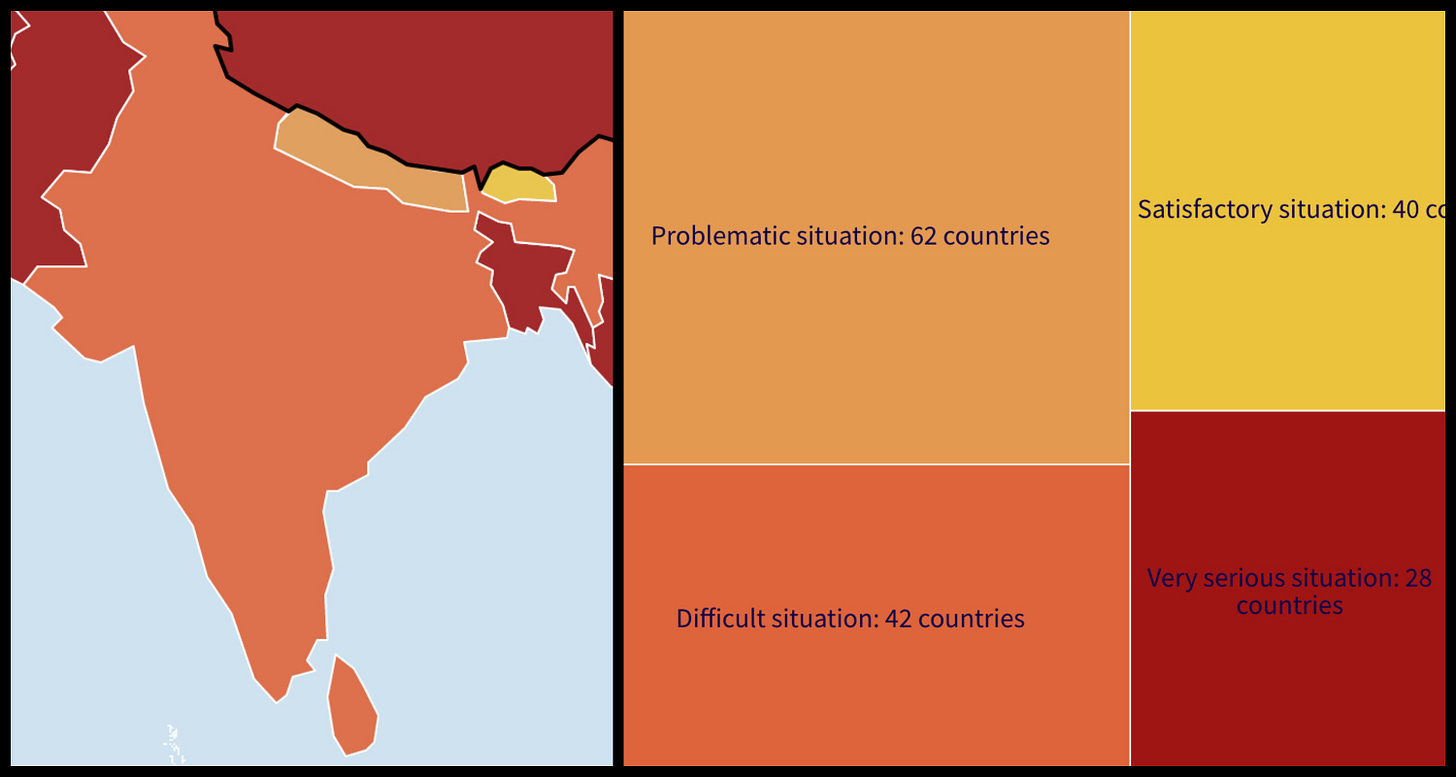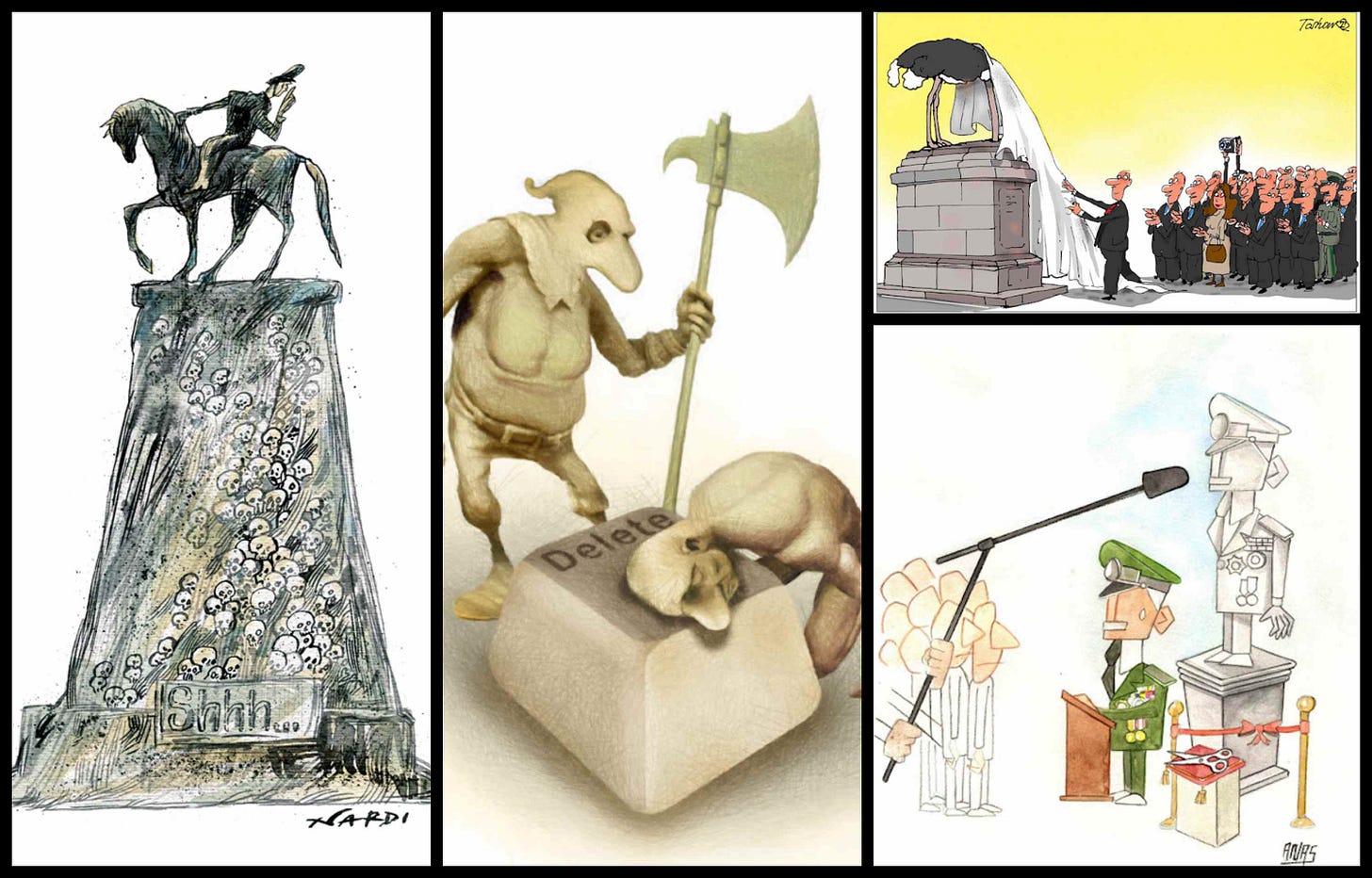Greetings for Eid, and Don't Forget to Say a Prayer for Freedom of the Press
Today is Eid-ul-Fitr, a day of celebration across South Asia, and also World Press Freedom Day, a time for sober reflection on the state of the media in India, Pakistan, Bangladesh and Sri Lanka.
A newsletter from The Wire & Galileo Ideas | Contributors: MK Venu, Seema Chishti, Siddharth Varadarajan, Sidharth Bhatia, Sushant Singh and Tanweer Alam | Editor: Pratik Kanjilal
The India Cable is taking a break today from its regular format on account of Eid but is bringing its readers a quick survey of the state of the media in India and the largest countries of South Asia as May 3 also marks World Press Freedom Day.
The RSF global index on press freedom for 2022 has India slipping eight positions, from 142 to 150 (out of 180 countries) in the past year. Pakistan does even worse, at 157 and Bangladesh is at 162. Sri Lanka saw a sharp drop, from 127 to 146 but Nepal has climbed from 106 to 76 and Maldives is at 87, down from 72. Bhutan is the true outlier, up from 65 to 33 and the only country in the region to be in the ‘Satisfactory’ category. The status of press freedom in India is ‘Difficult’, while Pakistan and Bangladesh are classified as being in a “very serious situation”
One day before the index came out, Prime Minister Narendra Modi was in Berlin where he met journalists along with his German counterpart in a ‘press conference’ where questions were not taken – at his insistence.
Richard Walker, DW’s chief international editor, added a postscript to his tweet when RSF’s new ranking emerged, drawing a connection that was obvious:
‘The Modi Government’s Escalating Offensive Against Freedom of the Press’
The situation in India is the subject of an editorial in The Wire today:
“Today is World Press Freedom Day but in India, May 3, 2022 marks the 575th day of Siddique Kappan’s incarceration in Uttar Pradesh for a story he never even got to write on the gang rape and murder of a Dalit woman in Hathras. Today is also the third month of Kashmirwalla editor Fahad Shah’s imprisonment in Srinagar and the fourth month of freelance reporter Sajad Gul’s jailing by the Jammu and Kashmir authorities…
“It is important to remember Kappan, Gul and Shah because they are the most visible symbols of the government’s full-spectrum assault on press freedom in India today. As recently as five years ago, the biggest occupational hazard the media had to contend with was the misuse of defamation as a means of harassment and intimidation. Today, however, the range of threats is far more deadly…
“Modi’s undeclared emergency is already in its eighth year and is showing every sign of escalating its offensive against the democratic rights and civil liberties of the people. The time for mincing words has long passed: India’s democracy is dying in bright daylight. And yet, this death is not inevitable. The press is under siege but must find ways to stand its ground, chronicle what is unfolding and raise its voice in solidarity with every journalist and media house in the firing line.”
(to read The Wire’s editorial, click here)
‘State and its functionaries are the biggest threat actor targeting media in Pakistan’
In Pakistan, Dawn has an editorial today on the state of the media in the country:
“The Pakistani state has long had a fraught relationship with the media, paying lip service to the notion of press freedom even while doing all it can to bend its practitioners to its will. Decades of overt and covert military interventions and frequently unstable civilian governments have created a landscape where the media, instead of being a watchdog for the public interest, is expected to serve as a conduit for a heavily securitised approach to domestic and regional developments. Reportage or opinions on ‘sensitive’ issues invites scrutiny by powerful quarters and entails risks to journalists that have varied in intensity and scope at different points in time….
“The last few years have been particularly challenging. Employing its social media outreach to devastating effect, the recently ousted PTI government did more to throttle mainstream media than perhaps any civilian government in the country’s history. Even well-regarded senior journalists critical of its performance would find themselves at the receiving end of an online mob lynching by troll armies using the canard of ‘fake news’ to malign and discredit them. The barrage of online abuse targeting women journalists was particularly disturbing, aiming as it did to shame them into silence through sexualised tropes and character assassination. Meanwhile, on the granular level of the newsroom, the government’s backers in the establishment micromanaged news coverage through coercive tactics not seen since Gen Ziaul Haq’s military regime…
“The PML-N, which has a major role to play in the ruling coalition, must now demonstrate that it will turn the page not only on the marked truncation in media freedom under the PTI government, but also on its own efforts to control the press through controversial legislation.”
(to read Dawn’s editorial, click here)
Speak now or forever hold your tongue
“In Bangladesh, the Daily Star has run a column by Amnesty International’s Saad Hammadi, on the state of media freedom in the country:
“Between January 2020 and February 2022, more than 200 journalists have been implicated across Bangladesh under the draconian Digital Security Act (DSA), leading, in some cases, to involuntary disappearance and pretrial detention.
“In August 2021, the Bangladesh Police told me that they are not required to reveal the number of cases they filed, or the number of people they accused or arrested for online dissent under the DSA at any given time. In response to my inquiry under the country's Right to Information Act, they argued that the public disclosure of such information could apparently "obstruct enforcement of the law.
“When information is denied to people and any attempt to expose truth by journalists is penalised by authorities, the state of freedom of expression in Bangladesh, including press freedom, is anyone's guess…
“Government policymakers remain adamant that the DSA can effectively address disinformation on digital platforms. Instead of breaking away from past acts of repression, the authorities have drafted new laws to regulate personal data, mass media, social media and over-the-top (OTT) media services like Netflix and other digital platforms. Human rights defenders, lawyers, journalists, academics, film-makers and civil society organisations all fear that these laws will be used, like the DSA, to target individuals or content deemed anti-state or anti-government.
“The proposed Data Protection Act, for instance, gives authorities broad powers to access, control and process data without judicial oversight. This would make journalists and their sources vulnerable and would lead to heightened self-censorship as their information can be accessed by the authorities. The law would also exempt state agencies from being held accountable for violating people's right to privacy. Moreover, the authorities would use vague and overbroad descriptions, such as the need to protect the "spirit of Liberation War," "sovereignty of state" or "friendly relations with foreign states" to access private information in encrypted communications on personal devices, or to censor content on digital platforms.
“This means that if someone expresses a critical view of the achievement of Bangladesh's Liberation War, or the country's relationship with another nation in a Facebook status, or even in a private message between friends on WhatsApp, that individual could be subjected to criminal punishment under the DSA, intrusive surveillance under the data protection law, or censorship under the digital, social media and OTT platform regulations. These laws and regulations are deeply problematic and clearly arbitrary in nature…
(to read Saad Hammadi’s column, click here)
In Nepal, MyRepublica ran an editorial to mark World Press Freedom Day:
‘The culture of silence among journalists on the rise’
“Babita Basnet, the editor of the vernacular weekly, Ghatana Ra Bichar, was heavily trolled by a group of people for one of her recent articles. Her article called for making a policy review of a law related to rape cases. She cited some examples of teen rape offenders whom she had visited in jails and interviewed. According to her write-up, they were in a relationship with their girlfriends but later were framed as rapists and sent to jail.
“The timing of the article landed her in soup. A cine artist had been arrested on the charge of raping a minor. So, the people thought she was trying to protect a perpetrator. According to her, the intention of the article was not to protect the perpetrator but to reexamine the issue and relevant laws.
"I couldn't visit social media sites that time because of the troll," Basnet says. "It was a bad time not only for me but also left my family members worried about me."
“Basnet is not the only journalist who has gone through such a situation. Cyber bullying of journalists is a recent phenomenon in Nepal. As compared to previous years, journalists are less active in social media. Every year, their social media engagement is decreasing. They visit those sites for information, but do not want to share ideas as this may court them unnecessary attacks in cyberspace.
"Silencing the journalists is the biggest threat in recent days," says a digital media expert who doesn't want to be named. "Now, politicians want to silence journalists by giving lucrative offers or bullying them with the help of their cadres. Ultimately, both methods discourage independent journalism.”
“The organized cyber bullying started when the then Prime Minister KP Sharma Oli ordered his cadres to attack his critics like wasps. Within days, they formed a 'cyber army' to troll journalists and writers who were critical of the government. There were a series of attacks against journalists and writers by the people close to the government…”
(To read the editorial, click here)
Freedom of the Press Canada held an international competition for the best cartoons on press freedom.
Here are some of the winners:
That’s it for today. We’ll be back with you tomorrow, on a device near you. If The India Cable was forwarded to you by a friend (perhaps a common friend!) book your own copy by SUBSCRIBING HERE.





